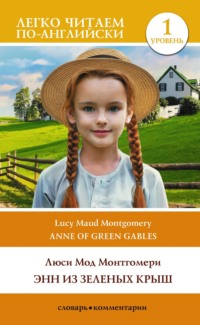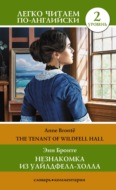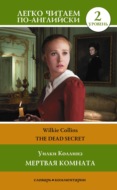Buch lesen: "Энн из Зеленых Крыш. Уровень 1 / Anne of Green Gables"
© Матвеев С. А., адаптация, комментарии, словарь
© ООО «Издательство АСТ», 2023
Anne of Green Gables
Chapter I
Mrs. Rachel Lynde is Surprised
Mrs. Rachel Lynde lived just where1 the Avonlea main road dipped down into a little hollow. She sat at her kitchen window one afternoon in June. The sun was warm and bright.
At half-past three, Matthew Cuthbert placidly drove over the hollow and up the hill. He wore a white collar and his best suit. Where did he go and why did he go there? Mrs. Rachel was very curious about that. Matthew rarely left home. He was very shy and hated to be among people.
"I'll go to Green Gables after tea and ask Marilla,” the woman finally concluded. "Something must have happened last night!”
After tea Mrs. Rachel set out2. The big, rambling house – Green Gables – where the Cuthberts lived was not far, it was built at the furthest edge of the other Avonlea houses.
Mrs. Rachel stepped out of the lane into the backyard of Green Gables. She rapped smartly at the kitchen door and stepped in.
Mrs. Rachel closed the door and noticed everything that was on that table. There were three plates, so Marilla expected someone.
"Good evening, Rachel,” Marilla said briskly. "This is a fine evening, isn't it? Won't you sit down?”
Marilla was a tall, thin woman. She looked like a woman of rigid conscience.
"I was afraid,” said Mrs. Rachel, "when I saw Matthew. I thought maybe he went to the doctor's.”
Marilla's lips twitched understandingly.
"Oh, no,” she said. "Matthew went to Bright River. We want to get a little boy from an orphan asylum3 in Nova Scotia. He'll come on the train tonight.”
Mrs. Rachel was actually shocked.
"Are you serious, Marilla?” she demanded.
"Yes, of course,” said Marilla.
Marilla and Matthew Cuthbert adopt a boy! From an orphan asylum!
"But why? But how…” she demanded disapprovingly.
"Well, we thought about it,” answered Marilla. "Mrs. Spencer was up here one day before Christmas. She said she wanted to get a little girl from the asylum over in Hopeton in the spring. Her cousin lives there. So we thought about a boy. Matthew is not young, you know – he's sixty. He isn't so spry as he once was. His heart troubles him. So we decided to ask Mrs. Spencer to pick us out a good boy when she went over to get her little girl. We want to get a smart boy of about ten or eleven. We had a telegram from Mrs. Spencer today – the mailman brought it from the station. So Matthew went to Bright River to meet him.”
"Well, Marilla, I'll just tell you that I think. You will do a very foolish thing – a risky thing. You don't know what you get. You want to bring a strange child into your house! It was only last week I read in the newspaper how a man and his wife took a boy out of an orphan asylum and he set fire to the house4 at night!”
Marilla knitted.
"I don't deny there's something in what you say, Rachel. But Matthew wanted to get a boy.”
Mrs. Rachel decided to go up the road to Robert Bell's and tell him the news. So she went away, to Marilla's relief.
Chapter II
Matthew Cuthbert is surprised
Matthew Cuthbert and the sorrel mare jogged comfortably over the eight miles to Bright River. It was a pretty road, the air was sweet with the breath of many apple orchards and meadows. Matthew enjoyed the drive. He dreaded all women except Marilla and Mrs. Rachel. He had an uncomfortable feeling that the mysterious creatures secretly laughed at him. He was an odd-looking personage, with long gray hair that touched his shoulders, and a full, soft brown beard.
When he reached Bright River there was no sign of any train. He thought he was too early, so he tied his horse in the yard of the small Bright River hotel and went over to the station house. The long platform was almost deserted. At the extreme end of it, a girl was waiting for someone or something. Matthew sidled past her as quickly as possible.
Matthew saw the stationmaster, and asked him about the five-thirty train.
"The five-thirty train arrived half an hour ago,” answered that brisk official. "But there was a passenger – a little girl. She's sitting out there. I asked her to go into the ladies' waiting room, but she told me gravely that she preferred to stay outside.”
"I do not expect a girl,” said Matthew blankly. "A boy must be here. Mrs. Spencer brought him from Nova Scotia for me.”
The stationmaster whistled.
"There's some mistake,” he said. "Mrs. Spencer came off the train with that girl and gave her into my charge5. She said you and your sister wanted to adopt her from an orphan asylum. That's all I know about it. I haven't got any more orphans hereabouts.”
"I don't understand,” said Matthew helplessly.
"Well, question the girl,” said the station-master carelessly. "She'll be able to explain, that's certain. Maybe they did not have the boys you wanted.”
He hurried away – he was hungry. The unfortunate Matthew looked at the girl. He wanted to demand of her why she wasn't a boy. He groaned and went towards her.
She watched him. Matthew did not look at her, but anyone could see this: a child of about eleven, garbed in a very short, very tight, very ugly dress of yellowish-gray cloth. She wore a faded brown sailor hat and beneath the hat were two braids of very thick red hair. Her face was small, white and thin, also much freckled. Her mouth was large and so were her eyes.
Her chin was very pointed; the big eyes were full of spirit. Her mouth was expressive and her forehead was broad and full.
As soon as she concluded that Matthew came to her she stood up. She grasped with one thin brown hand the handle of a shabby, old-fashioned bag; the other she held out to him.
"I suppose you are Mr. Matthew Cuthbert of Green Gables?” she said in a peculiarly clear, sweet voice. "I'm very glad to see you. I was afraid you wouldn't come for me. I was ready to go down the track to that big wild cherry-tree at the bend, and climb up into it to stay all night. It is lovely to sleep in a wild cherry-tree all white with bloom in the moonshine, don't you think? You can imagine you dwell in marble halls, can't you?”
Matthew took the scrawny little hand awkwardly in his. Then he decided what to do. He could not tell this child with the glowing eyes that there was a mistake. He will take her home and let Marilla do that. She won't stay at Bright River anyhow, so all questions and explanations will be deferred until they are at Green Gables.
"I'm sorry I was late,” he said shyly. "Come along. The horse is over in the yard. Give me your bag.”
"Oh, I can carry it,” the child responded cheerfully. "It isn't heavy. I've got all I have in it, but it isn't heavy. It's an extremely old bag. Oh, I'm very glad to see you, even if it is nice to sleep in a wild cherry-tree. We'll drive a long way, won't we? Mrs. Spencer said it was eight miles. I'm glad because I love it. Oh, it seems so wonderful to live with you and belong to you! The asylum is the worst place in the world. It's worse than anything you can imagine. They were good, you know, the asylum people. But there is so little scope for the imagination6 in an asylum – only just in the other orphans. It was pretty interesting to imagine things about them – to imagine that perhaps the girl who sat next to you was really the daughter of an earl. And she was stolen away from her parents. I liked to lie awake at nights and imagine things like that, because I didn't have time in the day. I guess that's why I'm so thin – I am dreadful thin, don't you think so? And I love to imagine I'm nice and plump, with dimples in my elbows.”
The child put out her hand and broke off a branch of wild plum that brushed against the side of the buggy.
"Isn't that beautiful? I hope that some day I shall have a nice dress as white as the plum flowers. That is my highest ideal of earthly bliss. I love pretty clothes. And I never had a pretty dress in my life that I can remember. This morning when I left the asylum I felt so ashamed because I wore this horrid old dress. All the orphans wear them, you know. A merchant in Hopeton last winter donated three hundred yards of this cloth to the asylum. Some people said it was because he didn't sell it, but I believe that it was out of the kindness of his heart. Oh, there are many cherry-trees here! This Island is the bloomiest place. I love it already, and I'm so glad to live here. Prince Edward Island is the prettiest place in the world! Those red roads are so funny! And what makes the roads red?”
"Well, I don't know,” said Matthew.
"I feel glad to be alive – it's such an interesting world! But do I talk too much? People always tell me I do. If you don't like it I'll stop. I can stop, although it's difficult.”
Matthew, to his own surprise, was very glad. Like most quiet folks he liked talkative people. He enjoyed the society of this little girl. So he said as shyly as usual:
"You can talk as much as you like. I don't mind7.”
"Oh, I'm so glad! It's such a relief to talk when one wants to. Mrs. Spencer said your place was named Green Gables. I asked her all about it. And she said there were trees all around it. I was very glad. I love trees. Is there a brook anywhere near Green Gables? I forgot to ask Mrs. Spencer that.”
"Well now, yes, there's one right below the house.”
"Great. It's my dream to live near a brook. I never expected it, though. Dreams don't often come true, do they? But just now I feel pretty nearly perfectly happy. I can't feel exactly perfectly happy because – well, what color do you call this?”
She twitched one of her long glossy braids over her thin shoulder and held it up before Matthew's eyes.
"It's red, isn't it?” he said.
"Yes, it's red,” she said resignedly. "Now you see why I can't be perfectly happy. Nobody can who has red hair. I hate that red hair. I think to myself, 'Now my hair is black, black as the raven's wing.' But it's not true, it is just plain red and it breaks my heart. Mrs. Spencer says – oh, Mr. Cuthbert! Oh, Mr. Cuthbert!! Oh, Mr. Cuthbert!!!”
They rounded a curve in the road and found themselves in the "Avenue.” The "Avenue” was a stretch of road four or five hundred yards long, completely arched over with huge apple-trees, planted years ago by an eccentric old farmer. Overhead was one long canopy of snowy fragrant bloom.
The child leaned back in the buggy, her thin hands clasped before her, her face lifted rapturously to the white splendor above.
"I think you're tired and hungry,” Matthew said.
"Oh, Mr. Cuthbert,” she whispered, "that place, that white place – what was it?”
"Well, the Avenue,” said Matthew. "It is a pretty place.”
"Pretty? Oh, no! It was wonderful, wonderful! I felt it here,” she put one hand on her breast, "it made a queer funny ache. And yet it was a pleasant ache. Did you ever have an ache like that, Mr. Cuthbert?”
"Well, I just can't recollect.”
"I have it often – whenever I see anything royally beautiful. But you can't call that lovely place the Avenue. We will call it the White Way of Delight. Isn't that a nice imaginative name? When I don't like the name of a place or a person I always imagine a new one and always think of them so. There was a girl at the asylum whose name was Hepzibah Jenkins, but I always imagined her as Rosalia DeVere. Other people may call that place the Avenue, but I shall always call it the White Way of Delight! I'm glad to get home. You see, I never had a real home.”
They drove over the crest of a hill. Below them was a pond. From the marsh they heard sweet chorus of the frogs.
"That's Barry's pond,” said Matthew.
"Oh, I don't like that name, either. I shall call it the Lake of Shining Waters. Yes, that is the right name for it. But why do other people call it Barry's pond?”
"I reckon because Mr. Barry lives up there in that house.”
"Has Mr. Barry any little girls? Well, not very little – about my size.”
"He's got one about eleven. Her name is Diana.”
"Oh! What a perfectly lovely name!”
The girl looked about her. They were on the crest of a hill. The child relapsed into silence. Matthew stirred uneasily. Marilla and not he will tell this girl won't have that home. By the time they arrived at the house Matthew trembled. He thought of the child's disappointment.
The yard was quite dark as they turned into it.
"Listen to the trees! They talk in their sleep,” she whispered, as he lifted her to the ground. "What nice dreams they have!”
Then she followed him into the house.
Chapter III
Marilla Cuthbert is Surprised
When Marilla's eyes fell on the odd little figure in the stiff, ugly dress, with the long braids of red hair and the eager, luminous eyes, she stopped.
"Matthew Cuthbert, who's that?” she ejaculated. "Where is the boy?”
"There wasn't any boy,” said Matthew wretchedly. "There was only her.”
He nodded at the child.
"No boy! Where is he?” insisted Marilla. "We asked Mrs. Spencer to bring a boy.”
"Well, she didn't. She brought her. I asked the station-master. And I brought her home. She was alone there.”
"Well, well, well!” ejaculated Marilla.
During this dialogue the child remained silent. Her eyes roved from one to the other. Suddenly
she grasped the full meaning of Marilla's words. The girl dropped her precious carpet-bag and clasped her hands.
"You don't want me!” she cried. "You don't want me because I'm not a boy! I expected it. Nobody ever did want me! Oh, what shall I do? I'll burst into tears!”
She did it. She sat down on a chair by the table, and continued to cry stormily. Marilla and Matthew looked at each other. Neither of them knew what to say or do. Finally Marilla said,
"Well, well, there's no need to cry so about it.”
"Yes, there is need!” The child raised her head quickly. She revealed her trembling lips. "You will cry, too, if you are an orphan and come to a place where nobody wants to see you because you aren't a boy!”
Something like a reluctant smile mellowed Marilla's grim expression.
"Well, don't cry anymore. We won't turn you out-of-doors8 tonight. You'll stay here until we investigate this affair. What's your name?”
The child hesitated for a moment.
"Will you please call me Cordelia?” she said eagerly.
"Call you Cordelia? Is that your name?”
"No, it's not exactly my name, but I like it. Cordelia – it's such a perfectly elegant name.”
"I don't know what you mean. If Cordelia isn't your name, what is?”
"Anne Shirley,” said the girl, "but, oh, please call me Cordelia. Anne is such an unromantic name.”
"Unromantic fiddlesticks!” said the unsympathetic Marilla. "Anne is a real good plain sensible name. No need to be ashamed of it.”
"Oh, I'm not ashamed of it,” explained Anne, "only I like Cordelia better. I've always imagined that my name was Cordelia. When I was young I imagined it was Geraldine, but I like Cordelia better now. But if you call me Anne please call me Anne spelled with an E. It looks nicer. A-n-n looks dreadful, but A-n-n-e looks more distinguished.”
"Very well, then, Anne spelled with an E, can you explain us this mistake? We asked Mrs. Spencer to bring us a boy. Were there no boys at the asylum?”
"Oh, yes, there were many boys at the asylum. But Mrs. Spencer said distinctly that you wanted a girl about eleven years old. And the matron says she thinks I will do9… You don't know how delighted I was! I didn't sleep all last night for joy. Oh,” she added reproachfully to Matthew, "why didn't you tell me at the station that you didn't want me and leave me there?”
"I'll go out to put the mare in, Marilla,” said Matthew hastily. "Have tea ready when I come back.”
"Did Mrs. Spencer bring anybody over besides you?” continued Marilla.
"She brought Lily Jones for herself. Lily is only five years old and she is very beautiful.”
"We want a boy to help Matthew on the farm. A girl is useless to us. Take off your hat. I'll lay it and your bag on the hall table.”
Anne took off her hat meekly. Matthew came back presently and they sat down to supper. But Anne did not eat. In vain she nibbled at the bread and butter.
"You do not eat anything,” said Marilla sharply.
Anne sighed.
"I can't. I'm in the depths of despair. Have you ever been in the depths of despair?”
"In the depths of despair? Never,” responded Marilla.
"Weren't you? Well, did you ever try to imagine you were in the depths of despair?”
"No, I didn't.”
"Then I don't think you can understand what it's like. It's a very uncomfortable feeling indeed. When you try to eat but you can't swallow anything, not even a chocolate caramel. I had one chocolate caramel once two years ago and it was delicious. Everything is extremely nice, but still I cannot eat.”
"I guess she's tired,” said Matthew. "Put her to bed, Marilla.”
Marilla prepared a couch in the kitchen chamber for the boy. But for the girl? Marilla lighted a candle and told Anne to follow her. Anne took her hat and carpet-bag from the hall table. They entered the little gable chamber.
"I suppose you have a nightgown?” Marilla questioned.
Anne nodded.
"Yes, I have two. The matron of the asylum made them for me. They're fearfully skimpy. I hate skimpy night-dresses. But one can dream in them, that's one consolation.”
"Well, undress quickly and go to bed. I'll come back in a few minutes for the candle.”
Anne looked around her wistfully. The whitewashed walls were painfully bare. The floor was bare, too, except for a round braided mat in the middle. In one corner was the high, old-fashioned bed. In the other corner was the aforesaid three-corner table. Above it hung a little mirror. Between table and bed there was the window. With a sob Anne hastily discarded her garments, put on the skimpy nightgown and sprang into bed. She burrowed face downward into the pillow and pulled the blanket over her head.
Marilla came again and deliberately picked up Anne's clothes, placed them neatly on a prim yellow chair, then took up the candle and went over to the bed.
"Good night,” she said, a little awkwardly, but not unkindly.
Anne's white face and big eyes appeared over the bedclothes.
"How can you call it a good night when you know it must be the worst night in my life?” she said reproachfully.
Marilla went slowly down to the kitchen and proceeded to wash the dishes. Matthew was silent.
"Well,” Marilla said wrathfully, "one of us will drive over and see Mrs. Spencer tomorrow. This girl will go back to the asylum.”
"Yes, I suppose so,” said Matthew reluctantly.
"You suppose so! Don't you know it? Matthew Cuthbert, I believe that child bewitched you! I can see that you want to keep her.”
"Well now, she's interesting,” persisted Matthew.
"Oh, she can talk fast enough. And I don't like children who have so much to say. I don't want an orphan girl, that's all. There's something I don't understand about her. No, she will go back to where she came from.”
"Of course, Marilla,” said Matthew.
Die kostenlose Leseprobe ist beendet.








